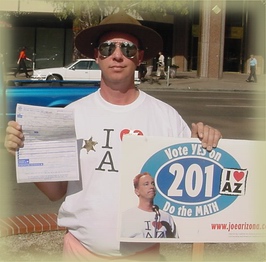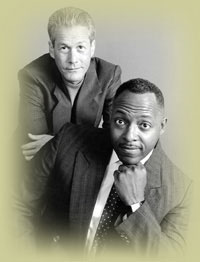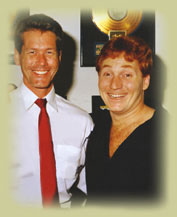In Memory of Richard Gierloff (1950-2018)
A memorial service was held Saturday, April 21, 2018, 2:00pm, at the Embassy Suites, 4400 S. Rural Rd., Tempe. More than 70 came and shared their memories and drank a toast to the great good man.
Cases
- "Sheriff Joe" v. "Joe Arizona"
- State v. David Michael Pecard
- State v. Mark Hartvigsen
- State v. Danny Bonaduce
- State v. Paul Huebl
- State v. Phillip Gilmer
- Road Rage Victim
- State v. John Doe
- The Chipman Road Case
 "SHERIFF JOE" v. "JOE ARIZONA":
"SHERIFF JOE" v. "JOE ARIZONA":
Favorable, swift, media exposure resulted in no charges being filed in this case.
Nick Tarr is a Phoenix actor and stand-up comic. In 2002 he was hired to portay "Joe Arizona" to promote a ballot initiative, Proposition 201, which was one of three gaming initiatives on that November's ballot. The Maricopa County Sheriff, who likes to promote himself with the fictitious moniker "Sheriff Joe", supported one of the other gaming Propositions.
This set the stage for one of the stranger election campaigns, even by colorful Arizona standards. "Sheriff Joe", not satisfied with one fictional name, began insisting that he was the "real Joe Arizona" and Nick's character was a carpetbagger and faker. Nick, as Joe Arizona, rose to the occasion and challenged the Sheriff to debate the relative merits of the two propositions. When the Sheriff avoided doing so on a local radio show, Nick began lampooning him. On Halloween, Nick costumed himself, well, costumed Joe Arizona, with dime store "sheriff" badges pinned to a surplus State Police shirt he had bought at a thrift store. Rounding out his costume was a "Smokey The Bear" hat, mirrored sunglasses and a pair of pink boxer shorts of the type sold by "Sheriff Joe" as one of his promotional gimmicks.
Thus attired, Nick began handing out Proposition 201 leaflets at a local eatery. Lunching at the restaurant though was the Sheriff's chief deputy, who was not amused at fun being poked at his boss. He called the State Police on his cell phone, insisting that Nick was trying to pass himself off as one of their officers. When they laughed off his complaint, he had his own deputies detain Nick for over an hour, finally issuing him a criminal complaint for Impersonating a Highway Patrol Officer.
I too had been having lunch at the same place and had watched the arrest unfold. Apalled by what I was seeing, I gave Nick my business card and called some of my news contacts. Every station featured the story on its evening news cast, with the Sheriff's spokesman desparately trying to "spin" his way out of disaster. I later checked with the court and found that, for all their bluster, the Sheriff's office never filed the complaint. Nick sued the Sheriff's Office for false arrest and malicious prosecution and settled his claim in June 2008 for $150,000.
 STATE v. DAVID MICHAEL PECARD:
STATE v. DAVID MICHAEL PECARD:David was featured in a full hour segment of CBS' 48 Hours news program November 1999 due to his having assumed more than twenty identities over his lifetime. He was also featured on "The Leeza Gibbons Show" in May, 2000. He worked primarily in law enforcement and in the military, including a brief tour in Vietnam ending when he was found to be only 12 years old. In December 1996 he was discovered to be working as an investigator for the Army under an assumed identity. Because he had been cross-certified by the Maricopa County Sheriff while he worked in Phoenix, this discovery led to a multicount indictment in State Court.
Although these charges were so serious that he could have spent the rest of his life in prison had he been convicted, all charges were dismissed when it was proven that the Sheriff's Office had systematically violated his constitutional rights while he was incarcerated. These violations included illegally recording his telephone calls to his attorneys, opening his legal mail, and holding him in punitive isolation 24 hours a day for nearly 18 months. He also suffered a permanent 92% loss of vision in one eye because of the Sheriff's refusal to provide even the simplest of medical care for him.
Mark is a prisoner from Alaska being held in a private prison in Arizona. He and all other Alaskan prisoners dispute the legality of this confinement. On October 19th 1996 he and eleven other prisoners walked away from the facility in protest of the illegality of their confinement, as well as the intolerable abuses inflicted upon them in that facility. They were all charged with escape. Prior attempts by the inmates to alert the officials in Pinal County to this situation had been ignored, so Mark headed north to Maricopa County upon his unauthorized furlough.
Mark surrendered the next morning to a Maricopa County Sheriff's Deputy, identifying himself as an Alaskan prisoner and asking for his help. After he was returned to the private prison he resisted further beatings and abuse at their hands as they attempted to coerce a guilty plea from him. We presented these facts at his trial in February 2000 and the jury acquitted him.
 STATE v. DANNY BONADUCE:
STATE v. DANNY BONADUCE:
A child star in the 1970's television program "The Partridge Family", Danny was working in Phoenix in 1995 as a radio personality when he was suddenly thrust back into the international media spotlight by being charged with several felonies, complicated by being on probation from the state of Florida.
Because of his status as a probationer the state could, and did, seek a mandatory prison sentence, something which would have destroyed any further career for Danny in the entertainment industry.
Every court appearance was the proverbial media circus. Each time the courtroom was packed with curious locals and television crews from Tokyo to Buenos Aeries to Berlin. I launched a vigorous, robust defense, ultimately battling the state down to two misdemeanors and stipulation to probation. There would be no prison for Danny. The only remaining problem was the possibility of the judge imposing some jail time as a condition of probation. This too could have had disastrous implications for any future career for Danny.
The day of sentencing arrived and the courtroom was standing room only. The judge indicated from the bench that Danny was going to get some jail time, just to show that he wasn't getting preferential treatment because of his celebrity. Sweeping my arm toward the packed courtroom, I argued that Danny was actually being treated worse, and for anyone else, the case would have been quietly settled long ago. Hearts pounding, we waited for the judge to impose sentence. The judge did not impose any jail time and when he handed us the sentencing papers, he had drawn a line through the ninety day jail term he had intended to impose on Danny when he had taken the bench. Quick thinking courtroom advocacy had changed his mind.
Ironically, Danny was able to parlay the massive publicity surrounding the case into a renewal of his career and has gone on to a very successful career in radio and television.
 STATE v. PAUL HUEBL:
STATE v. PAUL HUEBL:
This case provided me with one of the most dramatic moments of my career. Paul was working as a private investigator in Phoenix and one night served an eviction notice on a white collar con-man who was behind on the rent for his large house in upscale Paradise Valley. With his guard down because of his surroundings, Paul wasn't alarmed by the middle aged man coming toward him as he walked back to his car after serving the notice to the man's wife.
Suddenly the man clubbed Paul over the head with a .45 caliber pistol, knocking Paul to the ground. As the large man towered over Paul, threatening to shoot him, Paul realized he was fighting for his life. Paul grabbed his .38 revolver from his ankle holster as his blood ran down into his eyes and emptied it at the figure looming over him. Uncertain in the darkness whether any shot had struck the man, Paul fled to a hospital for treatment of his head injury.
The inept police investigation, botched at best, left Paul looking at a mandatory 15 year prison term for aggravated assault; several of his shots had, in fact, struck the man.
Eighteen months of exhaustive trial preparation ensued. Midway through trial preparation, the Maricopa County Attorney's office offered Paul a misdemeanor "anything short of dismissal" plea deal which Paul turned down. Maricopa County then withdrew from the case, citing a mysterious conflict of interest. The state then brought in a prosecutor from Pima County to try the case, Ken Peasley. Mr Peasley was the top prosecutor in the Pima County Homicide Bureau and had been named several times as the "Prosecutor of the Year". He had a reputation for playing the hardest of hardball and like to brag that he had put more men on death row than any other Arizona prosecutor.
During the following six week trial, Mr Peasley proved to be the equal of his reputation. He was an expert courtroom tactician and had an aggressive full-frontal-assault style.
We held our own though, meeting his style with my own aggressive cross examination and I felt, as I rested our case after six hard-fought weeks that Paul had a real chance of acquittal. Returning to my office at the end of that day, we were stunned to learn that our team had just located a witness with proof positive that the con-man had committed perjury during the trial. In less than ten minutes I had a subpoena for the witness, directing him to appear in court the next morning in the hands of a process server. Twenty minutes later, the witness had been served.
I spent a nearly sleepless night and early the next morning I was pacing up and down outside the courtroom, my new witness safely tucked away down the hall.
The impromptu hearing in judges chambers on my motion to reopen the case and present this new witness was absolutely explosive, with the sides almost coming to blows. I had never seen anything like it, nor had anyone else in that room. I remember the court reporter, her eyes big as saucers while her hands flashed over the keys of her steno machine, the long ribbon of paper spilling out of the tray onto the floor in a pile.
I was allowed to reopen, present the witness's testimony and the jury retired to deliberate.
Four minutes later, they sent out a note wanting to know if they could find the "victim" guilty of perjury ! I have that note framed and hanging on my office wall.
I spent the next eighteen months futilely trying to get the state to indict the "victim" for perjury, as well as indict Mr Peasley for his role in suborning that perjury. Ultimately, the victim was charged and pled guilty, but no charges were filed against Mr Peasley.
A few years later though, a different defense attorney, one in Pima County, caught Mr Peasley suborning perjury in a series of Death Penalty trials and Mr Peasley is today disbarred in disgrace.
Phillip Gilmer was seventeen when he and two others were charged with first degree murder in a double homicide arising from a streetside drug deal/rip off. His videotaped confession to the police, in which he claimed to be one of the shooters, presented a daunting challenge at trial. Up until that evening however, Phillip had never been in any trouble. He enjoyed the support of his pastor, his teachers from High School and many others in the community. At trial, we combined his good character defense, a meticulous comparison of the physical evidence to his "confession", and his own testimony to show that his statement to the police was untrue and made out of fear of his co-defendants, who were the real shooters. Phillip was acquitted after several days of jury deliberation.
Carl Kraft's story shows the power of positive media relations and immediate, aggresive investigation to influence an outcome. Carl is a local businessman who has operated his plumbing business in the valley for over thirty years. He was headed back to his shop after a typically busy day when he heard the siren of a firetruck just as he was about to turn onto the Hohokam Freeway. He pulled over at his first opportunity and let the firetruck pass. Pulling back into the rush-hour traffic, Carl noticed in his rearview mirror a white car gaining on his truck, the driver waving something out the window. Carl saw it was a gun just as the man opened fire. Carl could only step on the gas, trying to elude the irate driver who, it was learned later, felt that Carl had cut him off when yielding to the firetruck. An avid recreational target shooter, Carl had some handguns in the truck with him but, because of the other traffic, it never occurred to him to return fire. He fled, weaving in and out of the traffic until he reached his nearby shop where he called the police. From them he learned the terrible news; another man on the freeway, well ahead of the shooting, had been struck by a bullet and killed. Unfortunately for Carl, the police had been careless in gathering the initial witness statements and some of them characterized what had happened as an exchange of gun fire. Carl saw himself named as a suspect in a homicide on the evening news. That same evening though, I sent an investigator out to conduct our own interviews of these same witnesses. I gave him specific instructions; "Don't ask them 'What happened', ask them 'What did you see'"? This more precise question exonerated Carl; all of the witnesses were adamant that only the man in the white car had been shooting. The next morning I provided our tape recorded witness interviews to the prosecutors and held a press conference. That evening the news programs were explaining to their viewers the difference between asking "What happened" and "what did you see". The shooter, George Gonzales, was soon arrested. The State, which was at first going to charge Carl with murder, now wanted his help. They called Carl as a witness to testify at trial, Gonzales was convicted of 2nd degree murder and sent to prison. Carl continues to run his plumbing business.
Sometimes no publicity is the best media control of all. A few years ago I got a phone call from the agent of a professional football player on a team on the east coast. The player had been driving a van back to Phoenix with some friends when it rolled over. No one was seriously injured but the player was charged with DUI. Because of the NFL's strict substance abuse policies, a conviction would have far reaching negative consequences for him. Also, the League was very sensitive to negative publicity and merely having his arrest become public would also have further harmful consequences. The need to avoid conviction eliminated the easiest route to avoiding publicity, which is a quick guilty plea. Working behind the scenes, I was able to negotiate the charge down to a civil violation, essentially a speeding ticket. The fine was paid without my client ever having to appear in court and all publicity was avoided. Since the DUI was dismissed, the NFL concluded its substance abuse investigation on favorable terms. The player has since retired from professional sports.
In 1996, a young woman, after having gone missing over night, reported to her mother that she had been sexually assaulted by numerous members of a gang in an empty house on Chipman road. One of the poorest neighborhoods in Phoenix, the local residents were no strangers to all manner of crime and violence but this incident polarized the neighborhood, and soon, the entire community. Some local residents doubted the story from the outset, others believed the worst. The case dragged on, in part just due to the number of Defendants, but also because of the fierce battle being fought over discovery and pretrial motions. Meanwhile the twelve defendants, all of them minors themselves, languished in jail, unable to post the high bonds which had been set. As the two year mark approached with no trial in sight, family members began demonstrating in front of the courthouse. The newspapers ran editorials. The NAACP got involved. The battle had to be fought in the press as well as the courtroom. The State was showcasing the prosecution as proof it was cleaning up street gangs. Family members, and some others in the community thought the prosecution was racially motivated, even though the alleged victim was Black as well. As the Lawyer for one of the defendants, I had to find a middle ground, somewhere the public could stand and see my client, and the victim too, as people, rather than some stereotype. Slowly, the public dialogue about the case switched from "whose side are you on?" to broader issues of community, poverty and responsibility. Bail was finally reduced and most of the young men were released pending trial. Most of them finally accepted plea bargains to lesser charges, including my client. It allowed him to avoid the prospect of not only going to prison, but to avoid being labeled a sex offender as well. He had done so well since his release on bond that he not only did not receive any further jail time, the probation officer who had been supervising him while on release came to his sentencing to speak on his behalf.
